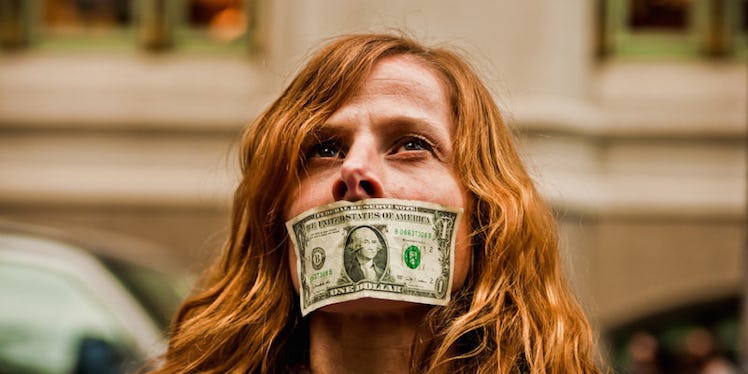
The Complicated Evolution Of Free Speech And How It Protects Hate
In 1919, Charles T. Schenck of the Socialist Party of America was convicted of violating the Espionage Act for distributing thousands of flyers to American servicemen drafted to fight in World War I.
He appealed saying the Espionage Act violated his First Amendment right to free speech, and it was here Justice Oliver Wendell Holmes stated the now ubiquitous argument regarding free speech:
The most stringent protection of free speech would not protect a man in falsely shouting fire in a theatre and causing a panic…The question in every case is whether the words used are used in such circumstances and are of such a nature as to create a clear and present danger that they will bring about the substantive evils that Congress has a right to prevent.
In 1978, the American Civil Liberties Union (ACLU) stood for the values of free speech by defending a neo-Nazi group wanting to march through the Chicago suburb of Skokie, an area populated by many Holocaust survivors.
The case was controversial and some ACLU members resigned on principle, though ACLU prevailed in defense of free speech.
As these two examples show, free speech wasn’t always an all-encompassing right, but instead a continually growing idea founded on protections of religious belief, political opinion and thought (among many others), and as Supreme Court Justice Benjamin Cardozo once stated, freedom of speech is an “indispensable condition of nearly every other freedom.”
Correspondingly, on Sunday, May 3 when the American Freedom Defense Initiative and anti-Islam activist Pamela Geller organized a “Draw Mohammad” contest in Garland, Texas, the right to assemble and profess a belief prevailed.
Two shooters armed with assaulted rifles shot and injured a security guard outside the Mohammad Art Exhibit and Contest, but were killed before others were hurt.
The two men used the contentious belief regarding visual depictions of Mohammad as an excuse to incite violence.
ISIS has since claimed responsibility for the attack, though there is little proof and officials believe the group is being opportunistic.
Executive Director of the American Civil Liberties Union of Texas, Terri Burke, issued the following statement regarding the shooting:
We join all Texans in denouncing this regrettable act of violence…We call upon everyone to engage in peaceful exchange. As the country’s staunch defenders of free speech and liberty, the ACLU is pleased to know that Garland ISD opens their venue to all people, no matter the viewpoint. Free speech is the bedrock of our democracy; it is best practiced in an atmosphere of openness and reasoned dialogue.
Common sentiment prevails among the American Muslim community.
ThinkProgress recently reported how spokesperson for the Council on American–Islamic Relations (CAIR), Ibrahim Hooper, stated that Geller’s freedom of expression should be protected and spokesperson for the Ahmadiyya Muslim Community, Harris Zafar, explained how Islam embraces the idea to promote an opinion without fear.
This is following in the wake of the Charlie Hebdo attacks, the shootings in Copenhagen that targeted a meeting on free speech and Islam, and other attacks where depictions of Mohammad stood as excuses for extremists to commit violence.
On May 5, the PEN American Center gave Charlie Hebdo the Toni and James C. Goodale Freedom of Expression Courage Award, and the divide has grown detailing what is free speech and what is bullying a teenager every day at school until he/she comes back with an assault rifle.
To be clear, there is unanimous agreement that violence is never justifiable.
However, the questions have been put forth: Is a Mohammad Art Exhibit or are Charlie Hebdo cartoons courageous, or should we assign the courage and value of free speech for those who genuinely challenge power and who attack insidious norms in society as opposed to what some consider a cultural enemy in the Western World?
Regarding the PEN Goodale award, New York Times reported 145 writers who signed a letter protesting the decision to award Hebdo for its steadfast courage in the face of violence.
The letter, in part, states,
“PEN is not simply conveying support for freedom of expression but also valorizing selectively offensive material: material that intensifies the anti-Islamic, anti-Maghreb, anti-Arab sentiments already prevalent in the Western world.”
In response, PEN posted on its website that the intent of the Charlie Hebdo cartoons “was not to ostracize or insult Muslims but rather to reject forcefully the efforts of a small minority of radical extremists to place broad categories of speech off limits.”
The intentions of the American Freedom Defense Initiative and anti-Islamists, such as Geller, are called into the public dialogue after the Texas shooting, which brings back the question of whether publicized Draw Mohammad events create a real possibility of imminent injury and incite an immediate breach of peace, or if it is simply offensive to a group of people.
The PEN protest and response also asks whether anti-Islamic hate mongering is cowardly or a courageous virtue fundamental to the continuation of freedom of expression.
Nonetheless, freedom of speech will continue to undergo new considerations as the world forces demands upon it.